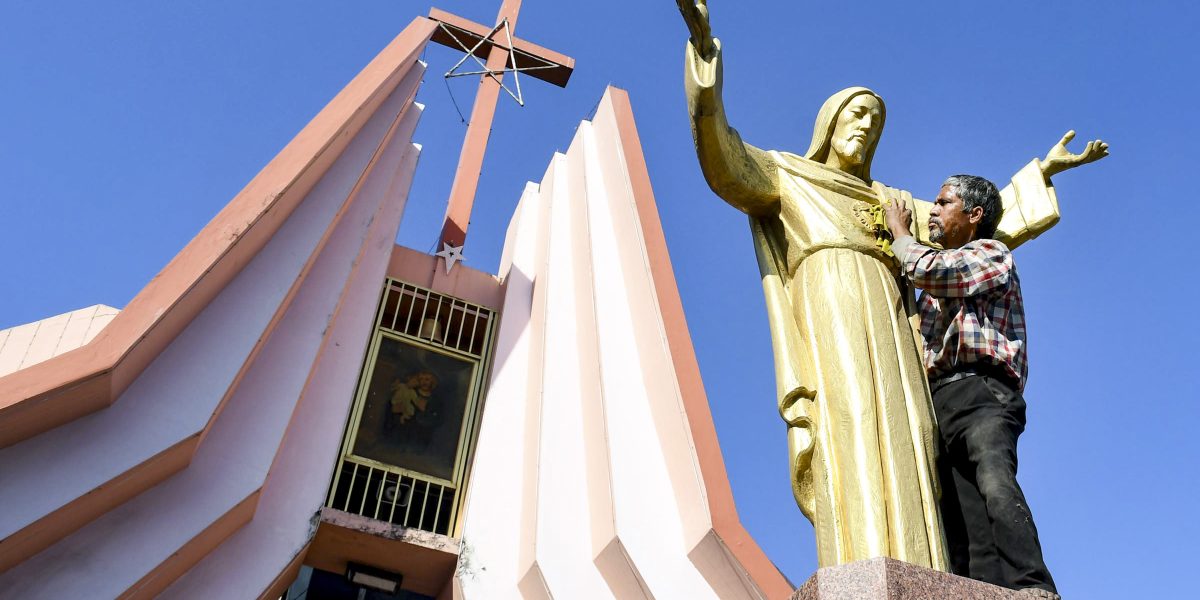
Reuters/Alamy
Concern is growing over religious persecution in India as the 74th anniversary of independence approaches on Sunday.
In a report recently covered by the Tablet the scale and sophistication of religious persecution in India was exposed, showing how social media apps like Facebook and WhatsApp were being used to spread disinformation and target minorities.
However, according to Open Doors, the extent of the discrimination was often rendered invisible by the highly localised nature of the incidents, and the complicity of local police, government and media in covering up or even assisting in crimes against religious minorities perpetrated by Hindu extremists.
“When you go to this social media, for example WhatsApp, there’s so many videos,” says Reena Verma, a Christian worker who partners with Open Doors in India. “Very influential leaders talk about how Christianity is degrading the society.”
She said this religious propaganda has noticeably affected attitudes to religious minorities.
“Previously people were very supportive of Christians. Now, if I introduce myself as a Christian, the first reaction would be: “Oh, you are a Christian? How much money did you get to convert?”
Ms Veerma added: “They’re now working like missionaries. They are going to every state and village. From there, they influence people. That’s how they get to influence the people. Earlier, it was a bunch of extremists coming in attacking the Christians. Now it’s local people.
“I’ve seen people living in a state of trauma. Christians are really affected psychologically and mentally by what’s happening. In one case, a local pastor had a heart attack shortly after his church was attacked.”
According to the findings of the report Destructive Lies commissioned by Open Doors and carried out by researchers at the LSE, social media platforms are being used to coordinate and then share violent vigilante attacks against Christians: “One of the first things that vigilante mobs do is to snatch phones, so the victims are unable to document violence, while perpetrators unfailingly make digital records of their own violent actions and then post it to various social media platforms. These posts advertise the perpetrators to other Hindutva groups and politicians as bold Hindu nationalists and consolidate their reputation for safeguarding Hinduism.”
Hindu nationalism has been a factor in Indian politics since the turn of the 20th century, but in recent years it has dominated Indian state and federal politics, with 2014 seeing the end of the long period of dominance by the relatively moderate INC (Indian National Congress) and the rise of the Hindu nationalist BJP (Bharatiya Janata Party) led by Prime Minister Narendra Modi. Asserting that Indian national identity is synonymous with Hinduism, the new wave of religious nationalism has created an atmosphere in which violence against minorities feels subtly authorised by state policy and ideology.
One of the report’s authors, who have asked not to be named, said: “The extent to which … state actors are complicit in the violence is shocking; it was there even at the ground level. The bureaucrats, the police, the lower court judges, all of them are …openly colluding to harass these minorities. And politicians, top religious leaders and powerful media owners [are giving] very overt signals that this [behaviour] is desirable.”
The report makes a series of recommendations for social media organisations to act against the ongoing abuse of their platforms by bad actors.
“What is really shocking is how un-seriously this is being taken by social media companies who support human rights,” says the unnamed co-author of Destructive Lies. “They should take it as seriously as if Christians were being persecuted in the U.S. or in the UK, applying the same standards to what is happening in India, which happens to be the biggest market. Just because they want profit from the Indian market, they should not allow bloodshed to take place.”
Dr David Landrum, director of advocacy at Open Doors UK and Ireland, said: “As India celebrates its independence it is a tragedy that the original unifying vision is being lost to a divisive culture of Hindutva extremism. With the use of new technologies to incite and direct violence the situation is deteriorating fast for India’s religious minorities. I hope that the report recommendations for greater online accountability will acted upon.”
This story first appeared on thetablet.co.uk





